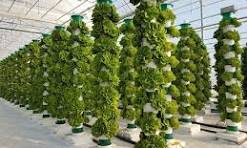Hydroponic Farming
Hydroponics is a method of growing plants using a nutrient-rich aqueous solution without soil. This approach allows for more controlled and efficient plant growth, as plants receive nutrients directly through their roots. Put into perspective, hydroponics is a sustainable and innovative approach to agriculture, offering a potential solution to challenges such as water scarcity and land-use limitations. Hydroponic
farming is mostly suitable for farms in urban cities. This is a very lucrative
area of agriculture that people can venture into to enable food security.
 |
| Greenhouse Hydroponic Farming |
Key Areas of Hydroponic Farming:
No soil needed: Plants are grown in an inert medium such as vermiculite, perlite, coconut fiber, or directly in water.
Nutrient solution: The vital nutrients needed for plant growth are dissolved in water and delivered directly to the roots—this precise supply of nutrients results in faster growth and higher yields.
Controlled Environment: Hydroponic systems are often used indoors or in greenhouses where environmental factors such as temperature, humidity, and light can be carefully controlled to optimize growing conditions.
Water Efficiency: Hydroponics uses significantly less water than traditional soil-based agriculture because water is recirculated within the system and not lost through the soil.
Higher Yield Potential: Under optimal conditions and nutrient management, hydroponic systems can produce higher yields per square meter than traditional agriculture.
 |
| Hydroponic Plantation |
 |
| Hydroponic Plantation |
Types of Hydroponic Systems
There are a variety of hydroponic techniques, including:
- Deep water culture (DWC)
- Nutrient film technology (NFT)
- Drip systems
- Aeroponics.
Each of the following systems of Hydroponics has its advantages and suitable plants.
Uses of Hydroponics Farming
Hydroponics is used to grow a wide range of crops, from leafy greens and herbs to tomatoes, strawberries, and even some root vegetables.
Challenges of Hydroponic Farming
Despite its advantages, hydroponics requires careful monitoring of pH, nutrient concentrations, and disease management. Initial setup costs can also be higher than traditional agriculture.
 |
| Vertical Hydroponic Farm |